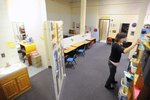

By Christopher Brewer
cbrewer@chronline.com
Officials with the Chehalis School District say now is the best time to modernize or potentially replace its three elementary schools, but does the community think so?
According to a scientific phone survey by Washington State University, the answer — for most — is yes.
Chehalis officials have looked into making significant improvements to the infrastructure of Cascade, Olympic, R.E. Bennett schools for their long-term viability, and last week held a meeting with members of the public on seven available options for modernizing, replacing or even consolidating all three schools into one site.
The district contracted with the Construction Services Group, or CSG, from Educational Service District 112 in Vancouver, Wash., to seek feedback from all seven options by conducting a phone survey of registered voters within the boundary of the district. Graduate students from Washington State University asked 258 people questions asking if they supported a proposed modernization or renovation, which would include passage of a bond.
CSG reported that just over 68 percent of respondents — 65 percent of which were women and 89 percent of which were homeowners — either supported or strongly supported a bond to modernize or replace Cascade and Bennett elementary schools, the two which scored the lowest in a facility assessment taken over the beginning of the school year by CSG. The survey had a 6 percent margin of error, according to CSG.
“The CSG is most concerned about Bennett,” said CSG consultant Doug Nichols during a guided tour of the school Tuesday afternoon. “It’s a beautiful historic school, but when our staff got inside and checked out a lot of what lies beneath what you see, they grew concerned that what’s here is reaching the end of its serviceable life.”
Chehalis superintendent Ed Rothlin says timing couldn’t be better for the school district to make upgrades to the buildings now, as the cost of construction materials remains low and interest rates remain at historically low levels. But the same economic conditions that have district officials thinking hard about floating a bond in February have socked citizens right in the wallet, making modernization of buildings that as of right now remain serviceable an interesting proposal.
“It’s something that will eventually need to be done, and we’re all taking a collective look on if we should do it now before it becomes even more expensive,” Rothlin said. “The economy has such an air of uncertainty to it that we really didn’t know how people would react — but people so far have reacted favorably.”
The most favorable reaction was received from the option to replace and expand Cascade, modernize Bennett’s gymnasium and music room, as well as upgrade certain portions of Olympic Elementary. That option, according to the district, would require passage of a $25 million bond — roughly $16.50 per $1,000 if one owned a home valued at $200,000.
“The community here seems to be very supportive of their education system, and that means everything when people look into districts ask them for money for construction or repair,” Nichols said. “We’ve been working this for three months and the public has been very involved in the process.”
It’s not just the buildings themselves that have district officials and the public concerned: the location and traffic configuration of Cascade and Bennett in an already crowded neighborhood brought a slew of concerns about parking and traffic safety along Market Boulevard, Southeast 2nd Street and Southeast 3rd Street from survey respondents.
“It might have been a good setup in the 1950s, but today it’s getting tougher and tougher for parents and kids come the first and last minutes of school,” Rothlin said. “It just gets so crowded around here when you have the buses, parents dropping off and picking up their kids — and the playground is an entire block away from Bennett. There’s definitely a significant safety concern here.”
Rothlin admitted the three buildings remain serviceable for the immediate future and praised maintenance staff members of each building for maximizing their longevity, but knows time will ultimately continue to take its toll on buildings that, while historic, will eventually require significant upgrades to maintain their usability.
“My hat is off to the people who have gotten us this far with what we have, but it would cost us more to operate the schools as they are as the years pass,” Rothlin said. “We’re hoping that as the weeks and months go on that we and the public can all figure out the best solution for our kids.”
•••
Christopher Brewer: (360) 807-8235